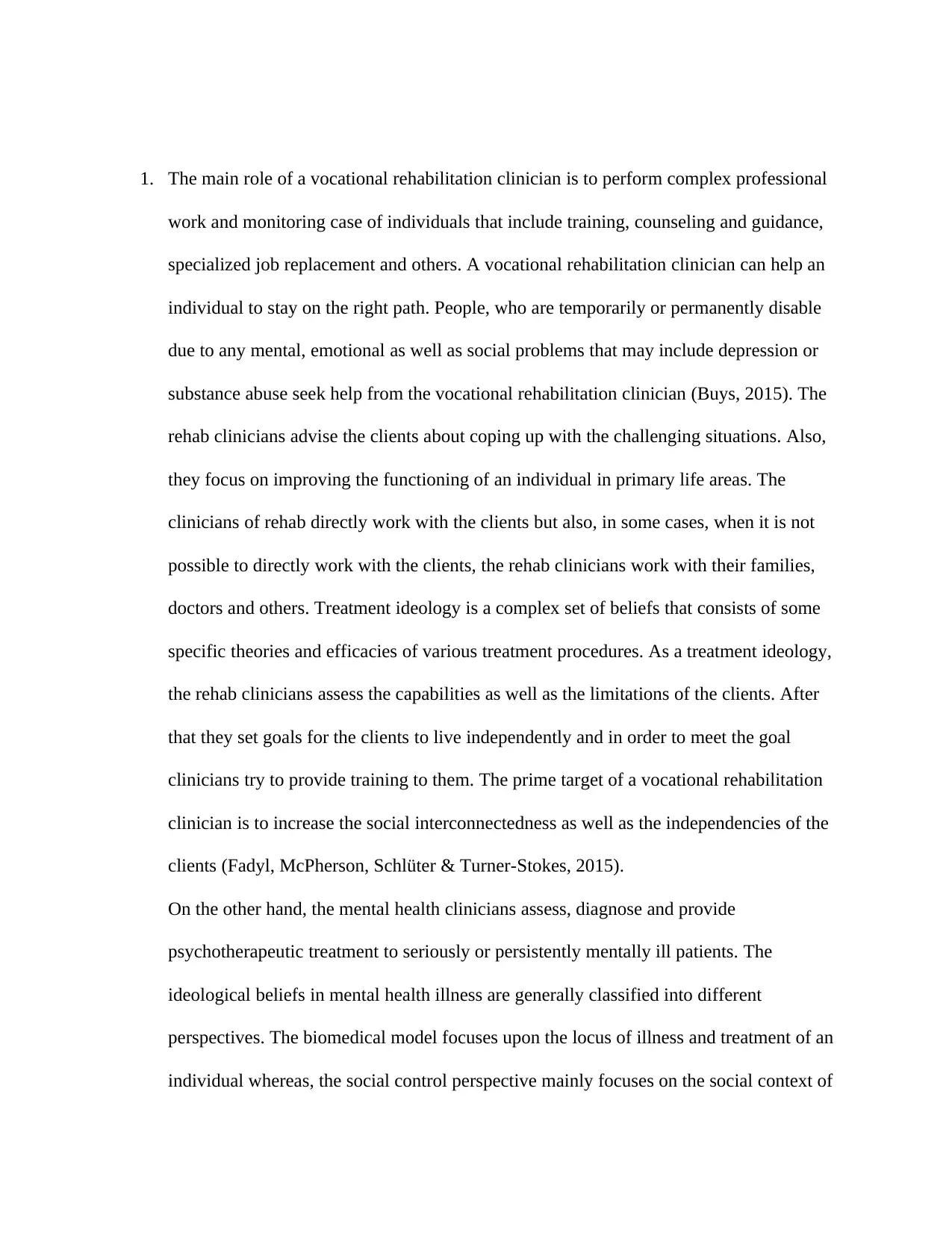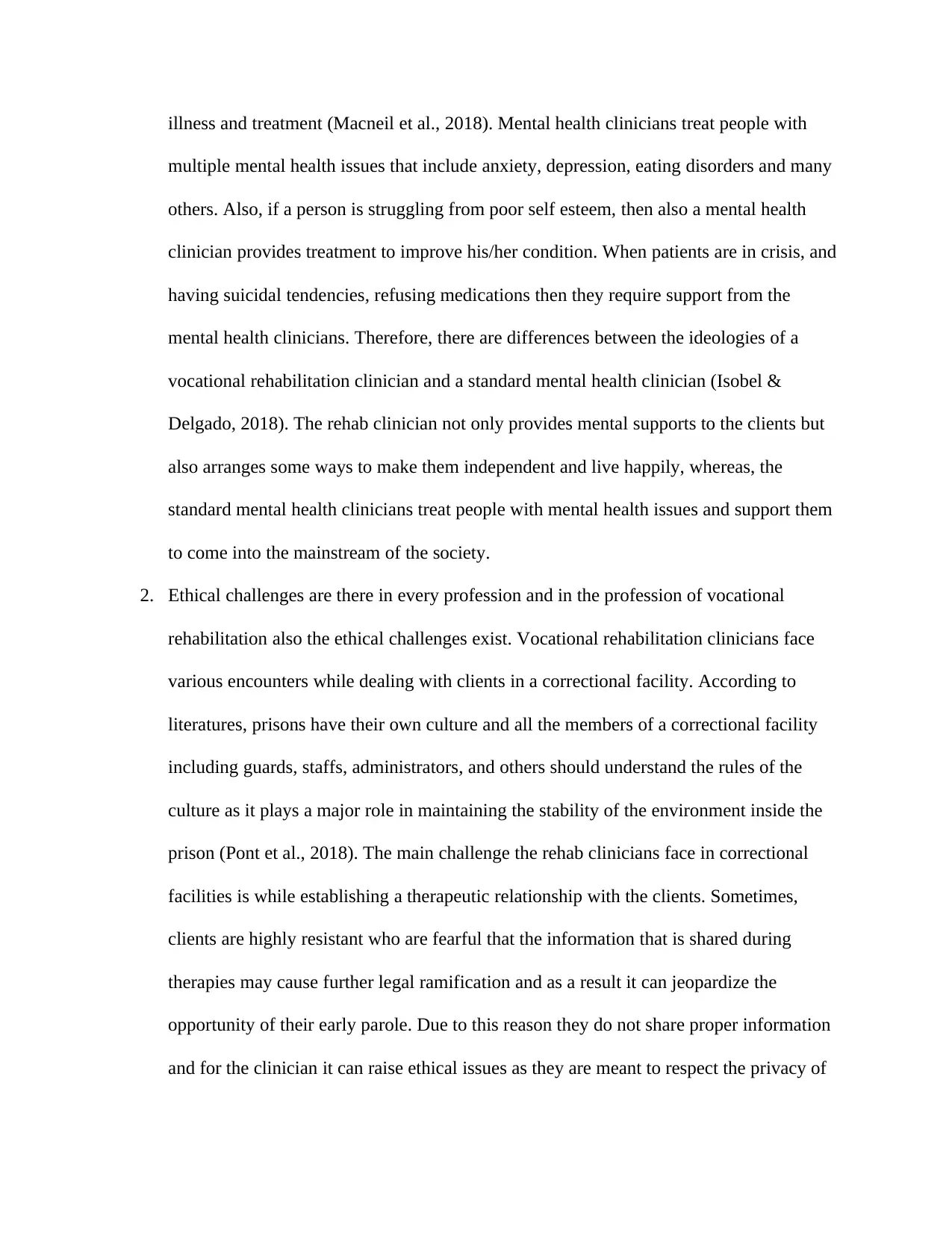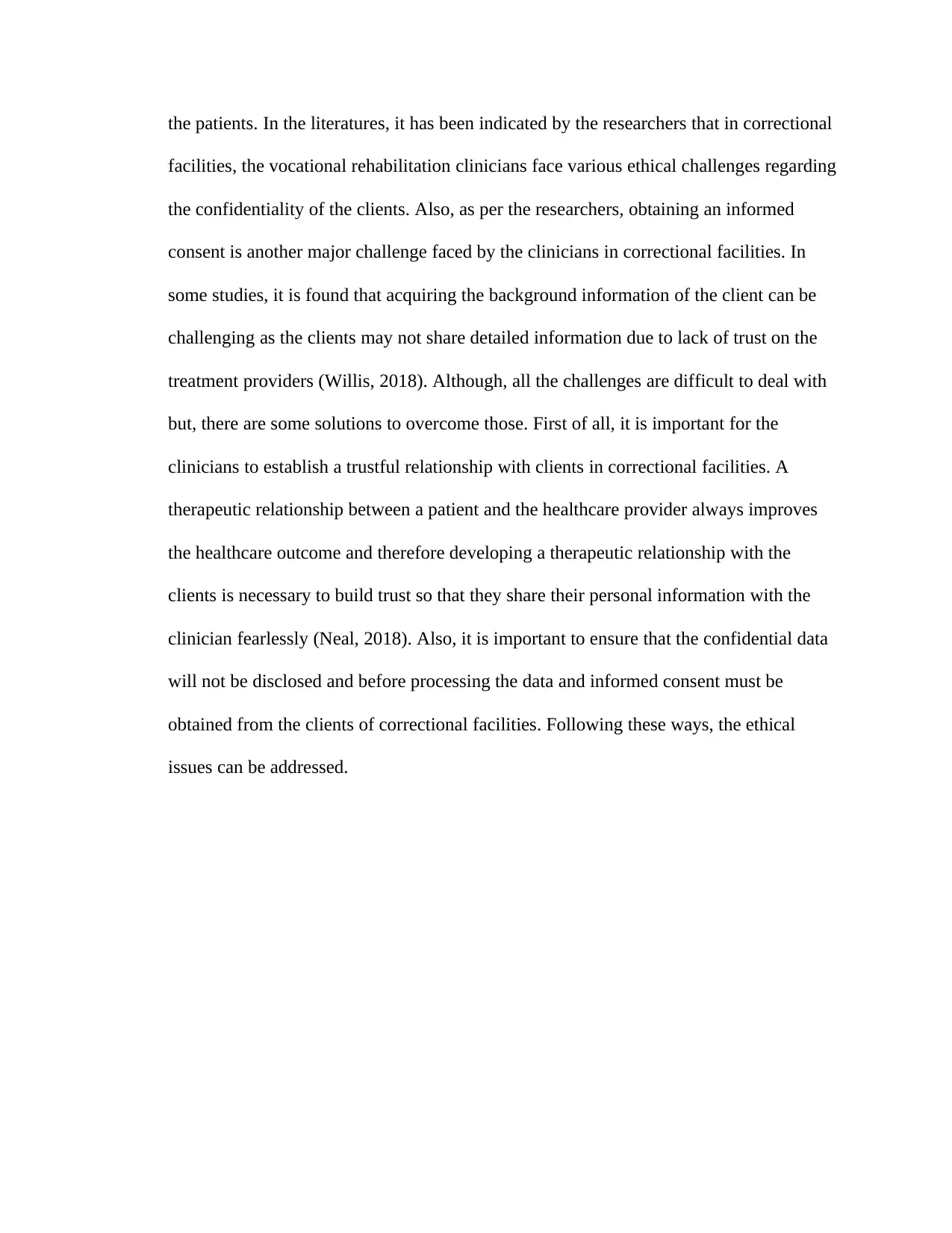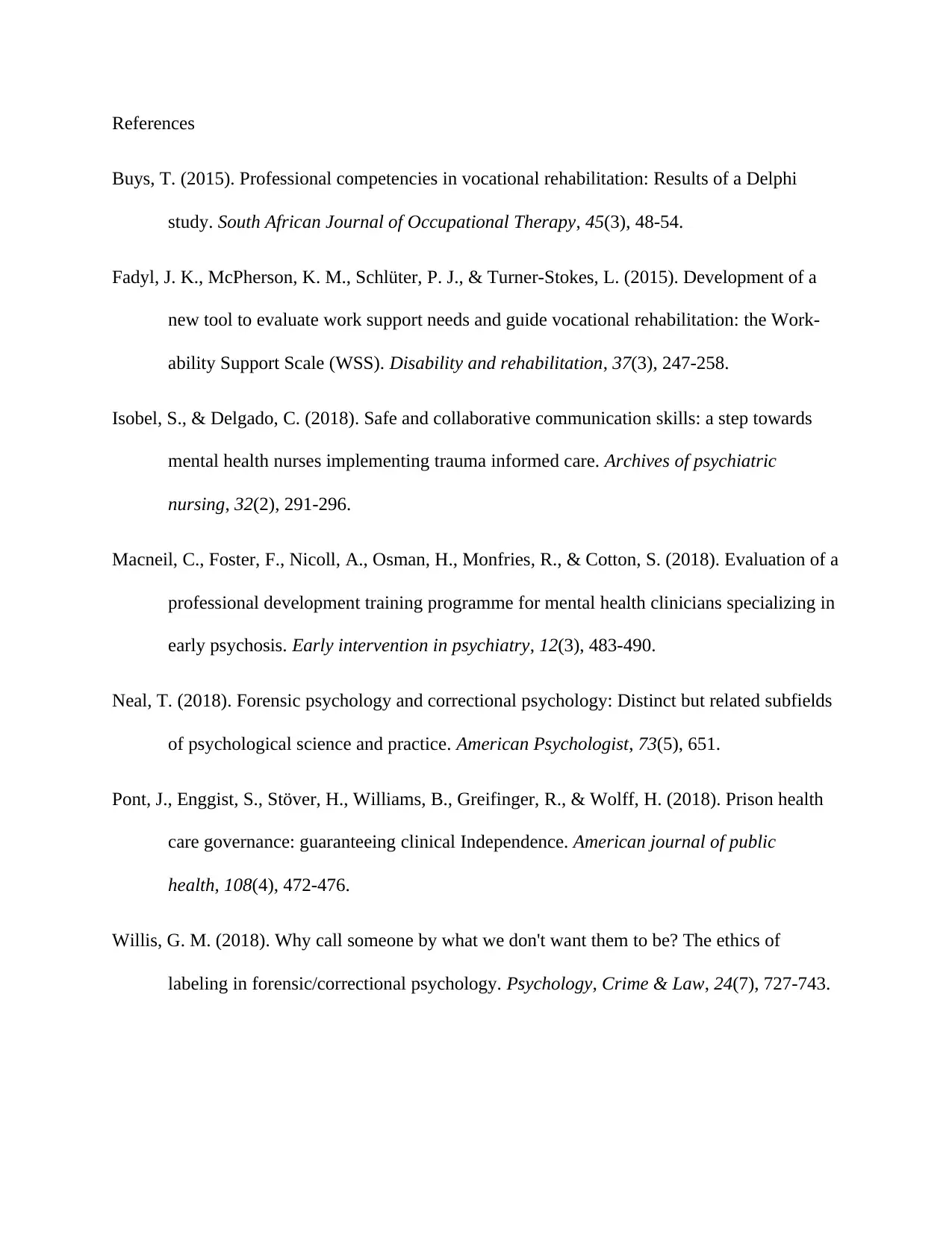PSY-623-O500 Assignment: Vocational Rehabilitation and Ethics
VerifiedAdded on 2023/01/11
|4
|1198
|39
Essay
AI Summary
This essay examines the distinct roles of vocational rehabilitation clinicians and standard mental health clinicians, focusing on their treatment ideologies and ethical considerations. Vocational rehabilitation clinicians assist individuals with disabilities in training, counseling, and job placement, aiming for independence and social integration. Mental health clinicians diagnose and treat mental illnesses, adhering to various ideological perspectives, such as the biomedical and social control models. The essay highlights ethical challenges faced by vocational rehabilitation clinicians, particularly in correctional facilities, including establishing therapeutic relationships, maintaining confidentiality, and obtaining informed consent. Solutions involve building trust, ensuring data protection, and obtaining consent to address these challenges.

1. The main role of a vocational rehabilitation clinician is to perform complex professional
work and monitoring case of individuals that include training, counseling and guidance,
specialized job replacement and others. A vocational rehabilitation clinician can help an
individual to stay on the right path. People, who are temporarily or permanently disable
due to any mental, emotional as well as social problems that may include depression or
substance abuse seek help from the vocational rehabilitation clinician (Buys, 2015). The
rehab clinicians advise the clients about coping up with the challenging situations. Also,
they focus on improving the functioning of an individual in primary life areas. The
clinicians of rehab directly work with the clients but also, in some cases, when it is not
possible to directly work with the clients, the rehab clinicians work with their families,
doctors and others. Treatment ideology is a complex set of beliefs that consists of some
specific theories and efficacies of various treatment procedures. As a treatment ideology,
the rehab clinicians assess the capabilities as well as the limitations of the clients. After
that they set goals for the clients to live independently and in order to meet the goal
clinicians try to provide training to them. The prime target of a vocational rehabilitation
clinician is to increase the social interconnectedness as well as the independencies of the
clients (Fadyl, McPherson, Schlüter & Turner-Stokes, 2015).
On the other hand, the mental health clinicians assess, diagnose and provide
psychotherapeutic treatment to seriously or persistently mentally ill patients. The
ideological beliefs in mental health illness are generally classified into different
perspectives. The biomedical model focuses upon the locus of illness and treatment of an
individual whereas, the social control perspective mainly focuses on the social context of
work and monitoring case of individuals that include training, counseling and guidance,
specialized job replacement and others. A vocational rehabilitation clinician can help an
individual to stay on the right path. People, who are temporarily or permanently disable
due to any mental, emotional as well as social problems that may include depression or
substance abuse seek help from the vocational rehabilitation clinician (Buys, 2015). The
rehab clinicians advise the clients about coping up with the challenging situations. Also,
they focus on improving the functioning of an individual in primary life areas. The
clinicians of rehab directly work with the clients but also, in some cases, when it is not
possible to directly work with the clients, the rehab clinicians work with their families,
doctors and others. Treatment ideology is a complex set of beliefs that consists of some
specific theories and efficacies of various treatment procedures. As a treatment ideology,
the rehab clinicians assess the capabilities as well as the limitations of the clients. After
that they set goals for the clients to live independently and in order to meet the goal
clinicians try to provide training to them. The prime target of a vocational rehabilitation
clinician is to increase the social interconnectedness as well as the independencies of the
clients (Fadyl, McPherson, Schlüter & Turner-Stokes, 2015).
On the other hand, the mental health clinicians assess, diagnose and provide
psychotherapeutic treatment to seriously or persistently mentally ill patients. The
ideological beliefs in mental health illness are generally classified into different
perspectives. The biomedical model focuses upon the locus of illness and treatment of an
individual whereas, the social control perspective mainly focuses on the social context of
Paraphrase This Document
Need a fresh take? Get an instant paraphrase of this document with our AI Paraphraser

illness and treatment (Macneil et al., 2018). Mental health clinicians treat people with
multiple mental health issues that include anxiety, depression, eating disorders and many
others. Also, if a person is struggling from poor self esteem, then also a mental health
clinician provides treatment to improve his/her condition. When patients are in crisis, and
having suicidal tendencies, refusing medications then they require support from the
mental health clinicians. Therefore, there are differences between the ideologies of a
vocational rehabilitation clinician and a standard mental health clinician (Isobel &
Delgado, 2018). The rehab clinician not only provides mental supports to the clients but
also arranges some ways to make them independent and live happily, whereas, the
standard mental health clinicians treat people with mental health issues and support them
to come into the mainstream of the society.
2. Ethical challenges are there in every profession and in the profession of vocational
rehabilitation also the ethical challenges exist. Vocational rehabilitation clinicians face
various encounters while dealing with clients in a correctional facility. According to
literatures, prisons have their own culture and all the members of a correctional facility
including guards, staffs, administrators, and others should understand the rules of the
culture as it plays a major role in maintaining the stability of the environment inside the
prison (Pont et al., 2018). The main challenge the rehab clinicians face in correctional
facilities is while establishing a therapeutic relationship with the clients. Sometimes,
clients are highly resistant who are fearful that the information that is shared during
therapies may cause further legal ramification and as a result it can jeopardize the
opportunity of their early parole. Due to this reason they do not share proper information
and for the clinician it can raise ethical issues as they are meant to respect the privacy of
multiple mental health issues that include anxiety, depression, eating disorders and many
others. Also, if a person is struggling from poor self esteem, then also a mental health
clinician provides treatment to improve his/her condition. When patients are in crisis, and
having suicidal tendencies, refusing medications then they require support from the
mental health clinicians. Therefore, there are differences between the ideologies of a
vocational rehabilitation clinician and a standard mental health clinician (Isobel &
Delgado, 2018). The rehab clinician not only provides mental supports to the clients but
also arranges some ways to make them independent and live happily, whereas, the
standard mental health clinicians treat people with mental health issues and support them
to come into the mainstream of the society.
2. Ethical challenges are there in every profession and in the profession of vocational
rehabilitation also the ethical challenges exist. Vocational rehabilitation clinicians face
various encounters while dealing with clients in a correctional facility. According to
literatures, prisons have their own culture and all the members of a correctional facility
including guards, staffs, administrators, and others should understand the rules of the
culture as it plays a major role in maintaining the stability of the environment inside the
prison (Pont et al., 2018). The main challenge the rehab clinicians face in correctional
facilities is while establishing a therapeutic relationship with the clients. Sometimes,
clients are highly resistant who are fearful that the information that is shared during
therapies may cause further legal ramification and as a result it can jeopardize the
opportunity of their early parole. Due to this reason they do not share proper information
and for the clinician it can raise ethical issues as they are meant to respect the privacy of

the patients. In the literatures, it has been indicated by the researchers that in correctional
facilities, the vocational rehabilitation clinicians face various ethical challenges regarding
the confidentiality of the clients. Also, as per the researchers, obtaining an informed
consent is another major challenge faced by the clinicians in correctional facilities. In
some studies, it is found that acquiring the background information of the client can be
challenging as the clients may not share detailed information due to lack of trust on the
treatment providers (Willis, 2018). Although, all the challenges are difficult to deal with
but, there are some solutions to overcome those. First of all, it is important for the
clinicians to establish a trustful relationship with clients in correctional facilities. A
therapeutic relationship between a patient and the healthcare provider always improves
the healthcare outcome and therefore developing a therapeutic relationship with the
clients is necessary to build trust so that they share their personal information with the
clinician fearlessly (Neal, 2018). Also, it is important to ensure that the confidential data
will not be disclosed and before processing the data and informed consent must be
obtained from the clients of correctional facilities. Following these ways, the ethical
issues can be addressed.
facilities, the vocational rehabilitation clinicians face various ethical challenges regarding
the confidentiality of the clients. Also, as per the researchers, obtaining an informed
consent is another major challenge faced by the clinicians in correctional facilities. In
some studies, it is found that acquiring the background information of the client can be
challenging as the clients may not share detailed information due to lack of trust on the
treatment providers (Willis, 2018). Although, all the challenges are difficult to deal with
but, there are some solutions to overcome those. First of all, it is important for the
clinicians to establish a trustful relationship with clients in correctional facilities. A
therapeutic relationship between a patient and the healthcare provider always improves
the healthcare outcome and therefore developing a therapeutic relationship with the
clients is necessary to build trust so that they share their personal information with the
clinician fearlessly (Neal, 2018). Also, it is important to ensure that the confidential data
will not be disclosed and before processing the data and informed consent must be
obtained from the clients of correctional facilities. Following these ways, the ethical
issues can be addressed.
⊘ This is a preview!⊘
Do you want full access?
Subscribe today to unlock all pages.

Trusted by 1+ million students worldwide

References
Buys, T. (2015). Professional competencies in vocational rehabilitation: Results of a Delphi
study. South African Journal of Occupational Therapy, 45(3), 48-54.
Fadyl, J. K., McPherson, K. M., Schlüter, P. J., & Turner-Stokes, L. (2015). Development of a
new tool to evaluate work support needs and guide vocational rehabilitation: the Work-
ability Support Scale (WSS). Disability and rehabilitation, 37(3), 247-258.
Isobel, S., & Delgado, C. (2018). Safe and collaborative communication skills: a step towards
mental health nurses implementing trauma informed care. Archives of psychiatric
nursing, 32(2), 291-296.
Macneil, C., Foster, F., Nicoll, A., Osman, H., Monfries, R., & Cotton, S. (2018). Evaluation of a
professional development training programme for mental health clinicians specializing in
early psychosis. Early intervention in psychiatry, 12(3), 483-490.
Neal, T. (2018). Forensic psychology and correctional psychology: Distinct but related subfields
of psychological science and practice. American Psychologist, 73(5), 651.
Pont, J., Enggist, S., Stöver, H., Williams, B., Greifinger, R., & Wolff, H. (2018). Prison health
care governance: guaranteeing clinical Independence. American journal of public
health, 108(4), 472-476.
Willis, G. M. (2018). Why call someone by what we don't want them to be? The ethics of
labeling in forensic/correctional psychology. Psychology, Crime & Law, 24(7), 727-743.
Buys, T. (2015). Professional competencies in vocational rehabilitation: Results of a Delphi
study. South African Journal of Occupational Therapy, 45(3), 48-54.
Fadyl, J. K., McPherson, K. M., Schlüter, P. J., & Turner-Stokes, L. (2015). Development of a
new tool to evaluate work support needs and guide vocational rehabilitation: the Work-
ability Support Scale (WSS). Disability and rehabilitation, 37(3), 247-258.
Isobel, S., & Delgado, C. (2018). Safe and collaborative communication skills: a step towards
mental health nurses implementing trauma informed care. Archives of psychiatric
nursing, 32(2), 291-296.
Macneil, C., Foster, F., Nicoll, A., Osman, H., Monfries, R., & Cotton, S. (2018). Evaluation of a
professional development training programme for mental health clinicians specializing in
early psychosis. Early intervention in psychiatry, 12(3), 483-490.
Neal, T. (2018). Forensic psychology and correctional psychology: Distinct but related subfields
of psychological science and practice. American Psychologist, 73(5), 651.
Pont, J., Enggist, S., Stöver, H., Williams, B., Greifinger, R., & Wolff, H. (2018). Prison health
care governance: guaranteeing clinical Independence. American journal of public
health, 108(4), 472-476.
Willis, G. M. (2018). Why call someone by what we don't want them to be? The ethics of
labeling in forensic/correctional psychology. Psychology, Crime & Law, 24(7), 727-743.
1 out of 4
Related Documents
Your All-in-One AI-Powered Toolkit for Academic Success.
+13062052269
info@desklib.com
Available 24*7 on WhatsApp / Email
![[object Object]](/_next/static/media/star-bottom.7253800d.svg)
Unlock your academic potential
Copyright © 2020–2026 A2Z Services. All Rights Reserved. Developed and managed by ZUCOL.





